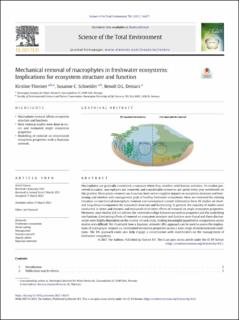| dc.contributor.author | Thiemer, Kirstine | |
| dc.contributor.author | Schneider, Susanne C | |
| dc.contributor.author | Demars, Benoît O L | |
| dc.date.accessioned | 2021-09-09T08:39:38Z | |
| dc.date.available | 2021-09-09T08:39:38Z | |
| dc.date.created | 2021-04-20T13:02:37Z | |
| dc.date.issued | 2021 | |
| dc.identifier.citation | Science of the Total Environment. 2021, 782 . | |
| dc.identifier.issn | 0048-9697 | |
| dc.identifier.uri | https://hdl.handle.net/11250/2774857 | |
| dc.description.abstract | Macrophytes are generally considered a nuisance when they interfere with human activities. To combat perceived nuisance, macrophytes are removed, and considerable resources are spent every year worldwide on this practice. Macrophyte removal can, however, have severe negative impacts on ecosystem structure and functioning and interfere with management goals of healthy freshwater ecosystems. Here, we reviewed the existing literature on mechanical macrophyte removal and summarised current information from 98 studies on short- and long-term consequences for ecosystem structure and functioning. In general, the majority of studies were conducted in rivers and streams and evaluated short-term effects of removal on single ecosystem properties. Moreover, most studies did not address the interrelationships between ecosystem properties and the underlying mechanisms. Contrasting effects of removal on ecosystem structure and function were found and these discrepancies were highly dependent on the context of each study, making meaningful quantitative comparisons across studies very difficult. We illustrated how a Bayesian network (BN) approach can be used to assess the implications of macrophyte removal on interrelated ecosystem properties across a wide range of environmental conditions. The BN approach could also help engage a conversation with stakeholders on the management of freshwater ecosystems. | |
| dc.language.iso | eng | |
| dc.title | Mechanical removal of macrophytes in freshwater ecosystems: Implications for ecosystem structure and function | |
| dc.type | Peer reviewed | |
| dc.type | Journal article | |
| dc.description.version | publishedVersion | |
| dc.source.pagenumber | 17 | |
| dc.source.volume | 782 | |
| dc.source.journal | Science of the Total Environment | |
| dc.identifier.doi | 10.1016/j.scitotenv.2021.146671 | |
| dc.identifier.cristin | 1905316 | |
| dc.relation.project | Norges forskningsråd: 297202 | |
| cristin.ispublished | true | |
| cristin.fulltext | original | |
| cristin.qualitycode | 2 | |
